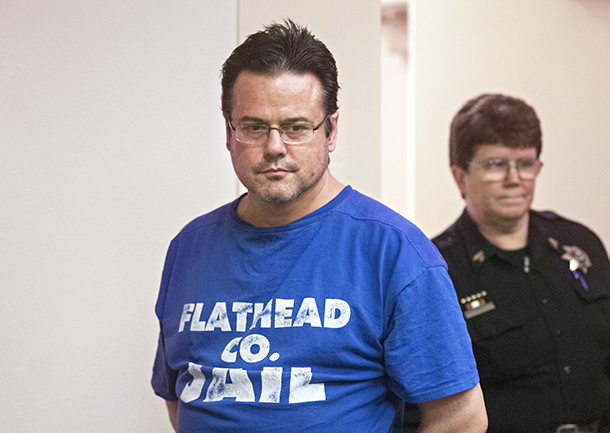Mark Ames called the death of Harold Gordon “a tragedy” but in the end did not apologize for shooting and killing his Marion neighbor in January 2014.
Ames was sentenced to 40 years at the Montana State Prison with 20 years suspended during a hearing in Flathead County District Court on May 11.
Judge Heidi Ulbricht handed down the sentence after Ames filed a last-minute motion to withdraw his Alford plea, arguing that attorney Lane Bennett, who was hired after the accused fired his public defenders, had not had sufficient time to review the case.
In a statement before sentencing, Ames also alleged that not all of the evidence had been reviewed in his case, although he did not deny shooting Gordon.
“I never anticipated for this to happen and I feel like it was a set-up that warrants further investigation,” Ames said. “There is a lot that has been misstated, misconstrued and misunderstood.”
Despite the motion to withdraw his Alford plea – the second that he has filed in recent weeks – the judge moved forward with sentencing.
According to court documents, Gordon owned a duplex in Marion and he leased one of the apartments to Ames’ wife. Gordon and Ames had a long and troubled relationship, but despite Gordon having a restraining order against him Ames still lived next door.
Just after midnight on Jan. 12, 2014, Ames fired several rounds from an AK-47 into Gordon’s apartment. Gordon grabbed a shotgun and was about to confront his neighbor outside when Ames allegedly shot and killed him with a .32-caliber semi-automatic pistol.
In September, prosecutors and Ames’ attorneys agreed to a plea deal where they would amend the charge from deliberate homicide to mitigated deliberate homicide if Ames pleaded guilty by Alford, which he later did.
An Alford plea is filed when a defendant believes that they are innocent but acknowledges that prosecution has enough evidence to find them guilty beyond a reasonable doubt.
Earlier this year, Ames fired his public defenders because one of them had “raised his voice” at him and allegedly pressured Ames into taking a deal. Ames then filed a motion to withdraw his plea because he said he did not get proper representation. In April, Lane Bennett took over as Ames’ attorney.
On April 24, Judge Ulbricht denied Ames’ motion to withdraw his plea. In her response, she stated there were no grounds for his motion following his testimony at his change of plea hearing.
“He acknowledged firing the AK-47 into Gordon’s home and that this precipitated Gordon coming outside with a shotgun,” Ulbricht wrote. “The Defendant testified that he retrieved a pistol and, upon Gordon’s entering into a heated argument with his wife on their front porch, (the) Defendant intervened and shot and killed Gordon with this pistol.”
At the May 11 sentencing, Gordon’s cousin and daughter took the stand to read letters from friends and family about what they hoped would take place at the hearing.
“For more than a year, I’ve had to deal with the murder of my father,” said Ruth Gordon, daughter of the deceased. “This past year and a half has been stressful, frustrating and infuriating.”
After hearing testimony from the family, Ames made a long, wandering statement about how he believed he was pressured into taking a plea deal and that he believes that not all of the evidence was examined.
Ulbricht handed down the sentence that was agreed upon in the plea deal.
